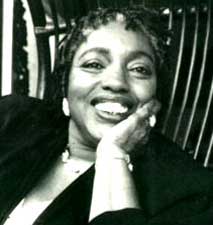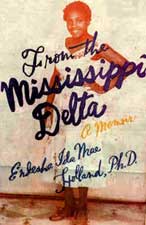Major Works
- From the Mississippi Delta (1997)
- The Autobiography of a Parader Without a Permit (1984)
Plays
- Miss Ida B. Wells (1984)
- Fanny Lou (1984)
- Requiem for a snake (1980)
- Second Doctor Lady (1979)
- The Reconstruction of Dossie Ree Hemphill (1979)
- Homebound
- The Passing of Granny Midwives 1900-1985
Biography of Endesha Ida Mae Holland (1999)
by Ericka James (SHS)
Living in poverty, racism, and broken dreams; having nowhere to turn, being separated by the color of her skin, and constantly being torn from the inside out. Author and playwright Endesha Ida Mae Holland was subjected to all of these things and still worked her way to a better life. Born on August 29,1944, Endesha Ida Mae Holland was “dragged, kicking and screaming, from her mama’s womb into the magnolia jungle”(Holland 11). Holland was born in Greenwood, Mississippi, to an ironing, granny, mid wife mother Ida Mae Holland and three daddies “depending on the time of year; a Christmas daddy, Mr. Ethan, who lived in Ohio; an Easter daddy, Mr. Warren, who lived in Chicago; and a birthday daddy, Mr. Goosch, who came every August” (23).
Holland is the baby of the family. She had two brothers: Simions, Junior, who lived in Chicago with his dad, and Bud; plus one sister named Jean. As the baby of the family, Holland was always with her mother, who told stories to Endesha while ironing white people’s clothes. The family lived in a double shotgun house on 114 East Gibbs Street, which was overrun with roaches and had a very low ceiling covered with newspaper clippings. Holland’s mother rented rooms out by the hour and also had permanent boarders.
At the age of nine, Holland was hit by a white lady driving a car. This accident slowed down Holland’s dreams of being a majorette, but it also brought in extra food and money because the driver of the car felt guilty and provided the food and money until she died.
Another traumatic event in Holland’s life occurred while she was babysitting the Lawrences’ daughter Becky Ann. Holland was raped by Mr. Lawrence, paid five dollars, and sent back to watch Becky Ann. She never told anyone because it wasn’t going to do any good. ” I decided then and there not to tell mama what had happened. What was the point? So we could both feel bad?”(Holland 87). After Holland’s tragic incident she was never the same again with her old friends. In her autobiography she says, “That’s why Everlena and I, close as we were, saw less and less of each other, and Percy Mae and I became closer and closer” (Holland 91) because Percy Mae had experienced the same thing.
As time went on Holland moved away from school and more and more toward prostitution. In her autobiography, Holland states, “A month later, I was expelled from Broad Street High School” (101). With nothing to do she began street walking and prostituting herself. She also got into stealing with her friends. Unfortunately, she got “sentenced to thirty days in the Laflore County Penal Farm , known as ” the workhouse,” and fined a hundred dollars (163). That was her first time going to jail.
On July 10,1961, she went into labor with her first and last child to her first husband Ike. She says, “In the months following Cedric’s birth (Holland’s son), Ike was a changed man. He took his duties as a father seriously” (181). But that quickly changed, and he went back to his old cheating ways. She continues, “Even Pearlie and Mae Liza told me how Poochie had been bragging about her affair with Ike “). Soon Holland was heading back to the “workhouse” for assault and battery charges. By the time she got out of the workhouse, Ike had moved (194).
Once again, with nothing else to do, she began street walking again, but this time she didn’t get as much business. The man she was after, a SNCC worker, was not interested, so she tried harder. And this is how she began her journey into the civil rights movement; she followed the man all the way to the Student Nonviolent Coordinating Committee building (SNCC). Most of the townspeople were there because they needed food, and the SNCC needed Ida to write information down for the people that needed help but didn’t know how to write. That started her commitment to the movement. Holland became one of their most-known speakers. She went to jail several times for the movement, but the most difficult time occurred when she and some others went to the Mississippi State Penitentiary. Holland says, ” We slept one to a cell, on iron slabs that , although they had no mattress and no covers, did have thirty-three (by my exact count) air holes that served mostly to pinch your skin when you turned over” (257-258). They passed the time by singing . Thirty-three days later they were released.
Soon after Holland returned from Parchman (the state penitentiary), she met Dr. Jackson. Dr. Martin Luther King was soon to arrive. When Dr. King did arrive, Holland brought him to meet her mother . Soon after that she was asked to speak on tour with Rosemary Freeman , Albert Barnett, and John Handy. The most important part of her trip covered Chicago , Detroit , New York, Maine, Vermont, and Minneapolis/St. Paul. In Minneapolis she found Shirley Ricket, who helped her to get into a university (284).
Returning back to Greenwood was a hard thing for Holland. Strange white people from the North were roaming around. All her life she had been having dreams about her mother getting burned up. A few weeks after she returned, her mother’s house was burned down. Her mother was rushed to the hospital, but she died hours latter. After her mother’s death, Holland promised to make something out of herself, so she decided to take Mrs. Shirley Ricket up on her offer to go to the University of Minnesota. She says “Five months afte mama died, I left Greenwood for good” (305).
In August, 1965, Holland turned twenty-one and enrolled in the University of Minnesota. In 1971 she sent for her son. It took her thirteen years to complete her
bachelor of Arts degree in black studies. She went on to get her “third doctor lady,” because her mother was a granny midwife, and she wanted to follow in her mother’s foot steps. Holland reveals, “Shortly before I got my Ph.D, I had added “Endesha” to my name ” (which means driver–-she drives herself and others forward) (308).
In 1979 Holland got into a class that she thought was an acting class, but it was an advanced senior class for playwrights. In the second semester she wrote Second Doctor Lady about her mother, and The Reconstruction of Dossie Ree Hemphill (also about her mother). In 1981 Holland was rewarded the $1,000 National Larraine Hansberry Award for the second-best play of 1981. She soon wanted to visit home, “I got my chance in October 18, 1991,which–thanks to Miss Frances Robertson and a committee of former schoolmates and dear friends –the mayor of Greenwood had officially declared Dr. Endesha Ida Mae”Cat” Holland day. I was going home! “(311). She received a brass key to the city.
Holland was a professor at the University of New York at Buffalo (1985 to 1993) before moving to the University of Southern California.
UPDATE 2015:
Endesha Ida Mae Holland died on Jan. 25, 2006, at nursing home in Santa Monica, California, at the age of sixty-one. She had been ill for several years with ataxia, a degenerative neurological condition. At the time of her death she was an emeritus professor of theater at the University of Southern California. She retired in from U.S.C. in 2003. She had taught in the American studies department at the State University of New York, Buffalo, before teaching at the University of Southern California. She was best-known for her play, From the Mississippi Delta, which was based on her memoir of the same name. It chronicled her journey from poverty and prostitution in the Jim Crow South to civil rights activism. Professor Holland’s three marriages ended in divorce. According to the University of Southern California, she is survived by a sister, Jean Beasley; a brother, Charlie Nellums; a son, Cedric; and a granddaughter.
Reviews
Critical Review of From the Mississippi Delta
by Ericka James (SHS)
From the Mississippi Delta, an autobiography by Endesha Ida Mae Holland, expresses all the traumatic problems that Holland had growing up. It tells of the things she went through, from being raped on her eleventh birthday to skipping school to streetwalking when she had nothing to do, which turned her into a prostitute.
From the Mississippi Delta was the most exciting book I have read in a long time. When I first saw the book, I thought it would be a big, meaningless, boring book of words; but as I got into it, it drove me more and more into reading it. The way she expresses herself and explains her situation, traumas, and victories were just the things I was looking for in a book. I especially felt anger when they started arresting all of the SNCC members (the Student Nonviolent Coordinating Committee which was the group tht worked to get blacks the freedom to vote without using violence). When they put all of those women in Parchment and then treated them like they weren’t anybody’s children– that really infuriated me ( 252-265).
From the Mississippi Delta has been described by the New York Times as, “a joyful celebration of survival against what seemed to be impossible odds and of fulfillment in a harsh world of injury and deprivation”(NY Times 11/25/91 92). Another reviewer has said,”You cannot help but be moved by this story of triumph. It draws you into its spell with humor and love, and then it carries your spirit on high until it lights up your heart.”
Out of all the things that Holland has been through, she still manages to snap right back, and I admire that in her. I also don’t read many books all the way through, but Holland captured my attention and interest. This is definitely a book that should be made into a movie!
Related Websites
- Endesha Ida Mae Holland, 61, Dies; ‘Mississippi Delta’ Writer by MARGALIT FOX in New York Times, February 1, 2006.
- Informative biography of Holland.
- Veterans of Civil War Movement obiturary for Holland.
- Maryclaire Wellinger’s Interview with Dr. Endesha Ida Mae Holland.
- Encyclopedia.com biography for Endesha Ida Mae Holland
Bibliography
- Holland, Endesha Ida Mae. From the Mississippi Delta. New York: Simon and Schuster, 1997.
- Tysn, Tiffany.”Playwright Comes Home.” Greenwood Commonwealth.October 17, 1991.
- Myers, Leslie R. From the Ms Delta. The Clarion-Ledger. August 2, 1991.
- Sullivan,Margerat. “Stories of sex, racism and rights put spotlight on Delta writer.”Atlanta Journal/Constitution 12/1/91.
- Henry III, William. “Playwright’s Own Story.” Time 11/25/91.



